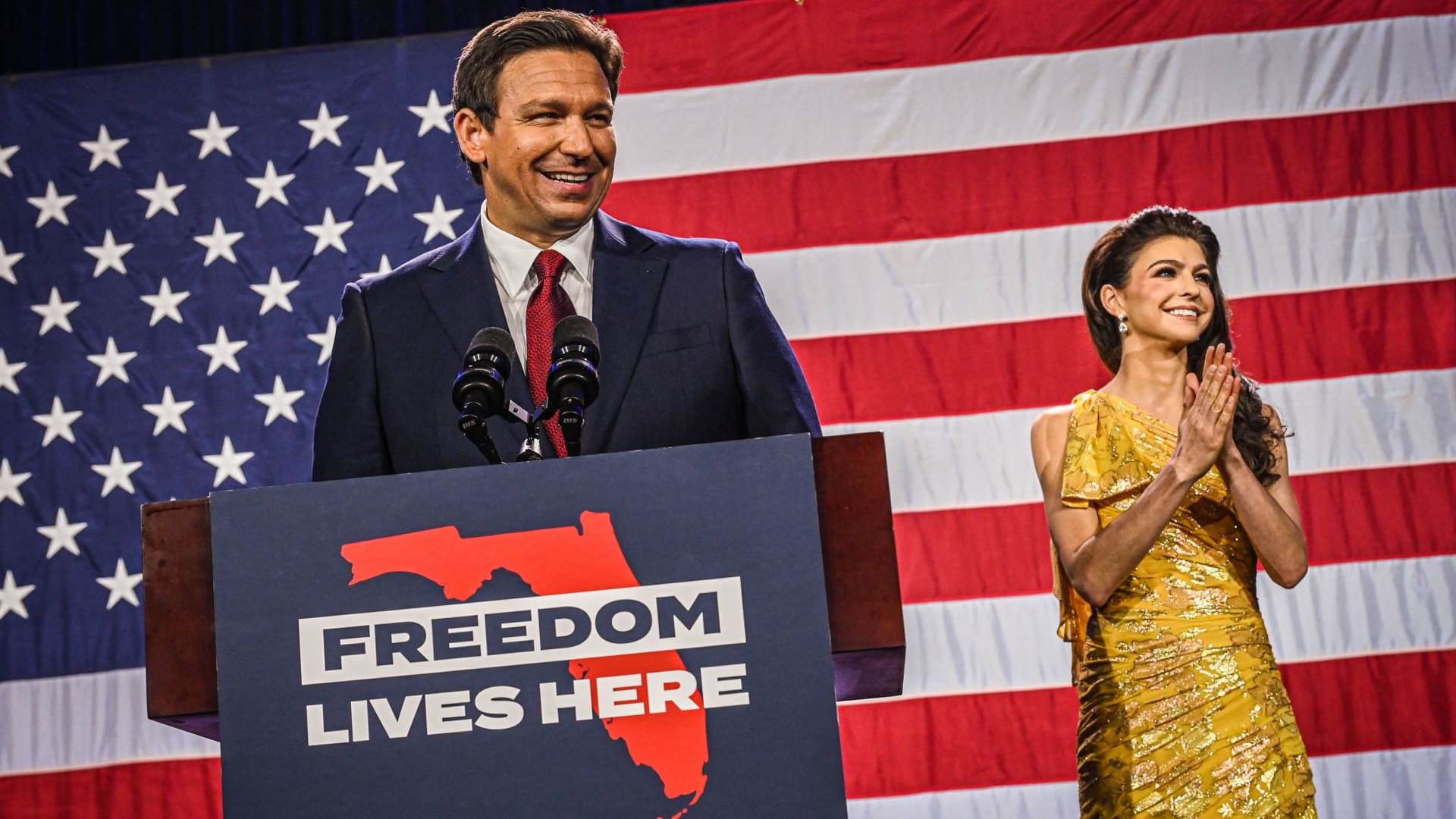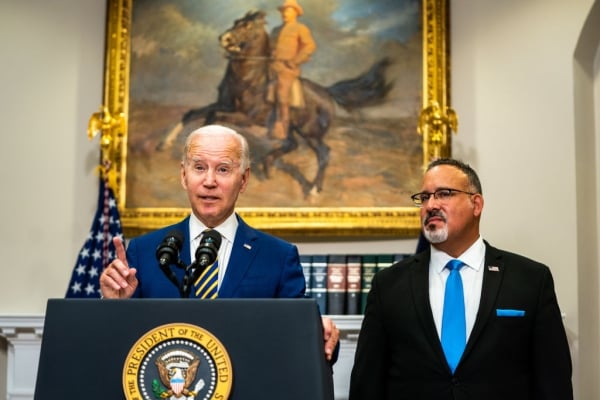Republican gubernatorial candidate for Florida Ron DeSantis with his wife Casey DeSantis speaks to supporters during an election night watch party at the Convention Center in Tampa, Florida, on November 8, 2022.
Giorgio Viera | AFP | Getty Images
Florida Gov. Ron DeSantis officially filed paperwork Wednesday to launch his 2024 presidential campaign, setting the Republican contender on a collision course with former President Donald Trump in the race for the GOP nomination.
DeSantis is set to personally announce his run during a Twitter Spaces conversation with Elon Musk at 6 p.m. ET on Wednesday.
The long-anticipated move marks the culmination of years of buzz around DeSantis, 44, whose resistance to Covid-era lockdown rules and willingness to engage in polarizing cultural fights have quickly made him a Republican darling.
It also makes official DeSantis’ simmering rivalry with Trump, burying their once-close relationship as some in the GOP look to replace the former president as their party’s standard bearer.
Trump has already pummeled the governor with relentless attacks for months. Trump and his allies have assailed DeSantis’ record, his political abilities and even his personality, while amplifying negative news about the governor. One pro-Trump PAC even cut an ad depicting an anecdote about DeSantis eating pudding with his fingers, which the governor has denied.
Read more: DeSantis brings history of business battles to presidential campaign
Trump’s aggression may have paid off. Polls of the potential primary field have showed DeSantis, once Trump’s close competitor, consistently losing ground for months, even as the governor toured key battlegrounds and racked up policy wins with his state’s GOP-held Legislature.
A Quinnipiac University poll released earlier Wednesday underscored the governor’s slide: Republican and GOP-leaning voters chose Trump over DeSantis by more than a two-to-one margin, 56% to 25%, in a matchup of the hypothetical primary field. That result showed Trump extending his gains and DeSantis losing ground from a previous Quinnipiac survey in late March.
A long-expected campaign
The move was hardly a surprise: DeSantis has been eyed as a 2024 presidential contender even before the end of the 2020 election cycle. While he has been mostly tight-lipped about his presidential ambitions, the governor in recent months has published a political memoir, hosted events for donors and conservative groups, embarked on a multi-state speaking tour and released campaign-style videos touting his achievements in Florida.
In the meantime, his allies have been hard at work mounting a well-funded political operation that has acted as a de facto campaign for the governor’s impending presidential bid.
The super PAC Never Back Down, founded by former Trump administration official Ken Cuccinelli, has already raised tens of millions of dollars as it encouraged DeSantis to run for president. A person familiar with the group’s activities confirmed to CNBC that it is expecting to work with an overall operating budget of at least $200 million.
That figure, first reported by The New York Times, could include more than $80 million that DeSantis’ allies are expected to try to move out of the governor’s old state-level political committee — a controversial transfer that has divided campaign finance experts.
A Yale- and Harvard-educated lawyer, DeSantis was elected to the U.S. House in 2012 and became a founding member of the conservative Freedom Caucus before resigning to run for governor of Florida in 2018.
Trump endorsed DeSantis in that gubernatorial primary, giving DeSantis a polling bump and leading him to cut an ad featuring his family embracing an array of Trump’s political slogans and catchphrases. DeSantis’ closeness to Trump went beyond just his rhetoric, with critics noting that the governor’s body language and hand gestures seemed to mirror Trump’s at times.
DeSantis handily won the primary and went on to narrowly defeat Democrat Andrew Gillum in the general election.
Stark divisions
As governor, DeSantis’ populist rhetoric and focus on divisive social issues quickly gained him a national reputation.
During the coronavirus pandemic, DeSantis pushed faster than other states to lift public health-related lockdown measures, arguing that the closures had harmed Florida’s economy. Those and other moves coincided with an influx of new residents to the state, but drew the ire of health experts and local officials, especially when Covid cases later surged.
DeSantis also courted controversy when he joined GOP efforts to protest President Joe Biden’s border policies by flying planeloads of migrants to the Massachusetts island of Martha’s Vineyard.
Meanwhile, his support for a controversial bill limiting discussion of sex and gender in public schools, dubbed “Don’t Say Gay” by critics, has morphed into an ongoing fight with Disney that has lasted well over a year.
Disney, one of Florida’s largest employers, publicly opposed the bill, joining critics who argued its vague language could lead to the targeting and marginalization of LGBTQ teachers and kids. DeSantis and his allies responded to Disney’s criticism by targeting Walt Disney World’s long-held special tax district and vowing to end the “corporate kingdom.” Disney has since sued DeSantis and others in federal court, accusing the governor of orchestrating a campaign of political retribution against the company.
In a state where population is growing but Democratic registration has fallen, DeSantis’ resistance to Covid safety rules and his perceived left-wing political foes were mightily rewarded. He trounced his Democratic opponent, former Rep. Charlie Crist, in Florida’s 2022 gubernatorial election, winning by more than 20 percentage points.
This time, he did it with virtually no help from Trump.
Polls consistently show Trump and DeSantis are by far the two most competitive names in the possible Republican primary field, though recent surveys show Trump pulling away from the pack.
With DeSantis’ profile on the rise, Trump’s view of the governor has soured. Shortly after the November midterms, Trump wailed at “Ron DeSanctimonious,” one of several wonky nicknames for DeSantis, along with “Ron DeSanctus” and, reportedly, “Meatball Ron.”
Trump has been damaged by his loss to Biden, the fallout from the Jan. 6, 2021, Capitol riot and the underperformance of many of his handpicked candidates in the midterms. Yet despite those bruises — and his escalating legal woes, including his indictment in a Manhattan hush money case and being found liable for sexual abuse and defamation in another case — Trump is the Republican Party’s current top choice for 2024.





















Discussion about this post